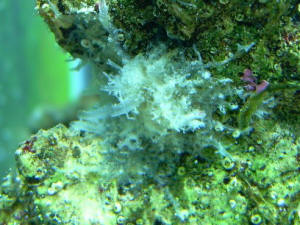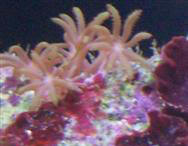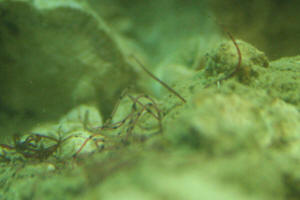|
FAQs about Non-Vertebrate Animal
Identification
22
Related Articles: Marine Invertebrates, Marine Invertebrate Systems, Marine Invertebrate Compatibility,
Marine Invertebrate Disease,
Marine Invertebrate
Reproduction, Quarantine of Corals and
Invertebrates, Feeding
Reef Invertebrates, Lighting
Marine Invertebrates, Water Flow, How Much
is Enough,
Related FAQs: Non-Vert IDs 1, Non-Vert IDs 2, Non-Vert IDs 3, Non-Vert IDs 4, Non-Vert IDs 5, Non-Vert IDs 6, Non-Vert IDs 7, Non-Vert IDs 8, Non-Vert IDs 9, Non-Vert IDs 10, Non-Vert IDs 11, Non-Vert IDs 12, Non-Vert IDs 13, Non-Vert IDs 14, Non-Vert IDs 15, Non-Vert IDs 16, Non-Vert IDs 17, Non-Vert IDs 18, Non-Vert. ID 19, Non-Vert. ID 20, Non-Vert. ID 21, Non-Vert. ID 23, Non-Vert. ID 24, Non-Vert. ID 25, Non-Vert ID 26, Non-Vert ID 27, Non-Vert ID 28, Non-Vert ID 29, Non-Vert ID 30 Non-Vert ID 31, Non-Vert ID 32, Non-Vert 33, Non-Vert ID 34, Non-Vert ID 35, Non-Vert ID 36, Non-Vert ID 37, Non-Vert ID 38, Non-Vert ID 39, Non-Vert ID 40, Non-Vert ID 41, Non-Vert ID 42, Non-Vert ID 43, Non-Vert ID 44, Non-Vert ID 45, Non-Vert ID 46, Non-Vert ID 47, Non-Vert ID 48, Non-Vert ID 49, Non-Vert ID 50, Non-Vert ID 51, Non-Vert ID 52, Non-Vert ID 53, Non-Vert ID 54, Non-Vert ID 55, Non-Vert ID 56,
Non-Vert ID
57, Non-Vert ID 58,
Non-Vert ID 59,
Non-Vert ID 60, Non-Vert ID 61,
& Marine Invertebrates, Marine Invert.s 2, Marine Invert.s 3, & FAQs about:
Marine Invertebrate Behavior,
Marine Invertebrate
Compatibility, Marine
Invertebrate Selection, Marine
Invertebrate Systems, Feeding
Reef Invertebrates, Marine
Invertebrate Disease, Marine
Invertebrate Reproduction, &
& LR
Life Identification, LR
Hitchhiker ID 1, Anemone
Identification, Aiptasia
Identification, Aiptasia ID 2,
Worm Identification, Tubeworm ID, Polychaete Identification, Snail Identification, Marine Crab
Identification, Marine Invert.s 1,
Marine Invert.s 2, Marine Plankton,
|

|
| Can you help me ID this?
(Syconoid?) 2/7/07 Have this pic posted on a forum as well but
I do not know if I did it right. This is about 3 weeks in the
making. <Nice picture!> The tank is about 3 months old. Do I
need to get on this or is it safe to leave. <Safe, harmless,
beneficial. I'm no expert on photo-ID of sponges, but I suspect
a Syconoid sponge is the culprit. Try matching up what you have
here: http://www.wetwebmedia.com/spongeidfaqs.htm
and see what you come up with!> Thank you for all your help with
my other questions as well. -JL <Welcome, good luck and welcome
to the wonderful hobby! -GrahamT> |
| Can you help me ID this?
2/7/07 Have this pic posted on a forum as well but I do not
know if I did it right. This is about 3 weeks in the making. The
tank is about 3 months old. Do I need to get on this or is it safe
to leave. Thank you for all your help with my other questions as
well. -JL <A sponge of some sort... not harmful... I would leave
as is. Bob Fenner> |
|

|
Mound builder, SW invert. ID guess
2/6/07 Hi, we have a marine tank set up 7
weeks. All's well. We purchased a rock with
mushrooms. We have witnessed very fine floaty hair like
strands coming from under the sand beside this rock. These
strands "collect" pieces of sand & have built a small
mound against the rock....any ideas what it might be? Kind regards Sue
Carveth <Mmm, might be the Corallimorpharian itself... could be an
Ophiuroid or one of many worms... Bob Fenner> Re: mound builder 2/9/07 So are you saying
this creature could be a basket star or brittle star? <Could be
numerous ones of the latter> I've read this can be good or
bad...what is your opinion? <Is not bad> We have
hermit crabs 5 larger (1 inch) & had 2 both of which I've found
out of their shells & dead ...could this be connected? <Mmm, not
likely, no> Today I saw something next to the rock
projecting from the sand .....looks likes a very pale skin colour tube
like thingy (3mm diameter ) with jagged edges....looks like the hair
like fronds are projecting from it. Most of the floaty hair
like fronds range from a couple of inches to 4/5 inches in length &
whitish in colour, although today a very long one has appeared &
wrapped itself around the sponge growing on the rock. Under
microscope it looks as though it is darker in colour & segmented
& may have flattened thorny bits on it. It also looks
like it is not attached?? Tried a photo but it wasn't
visible against the sand! Thanks for your time....Sue <Welcome.
BobF>
Hitchhiker ID...Ophiuroids I think - 02/04/07 Hi
(again) <<Hello Joanne>> Thanks for the info on the shrimp,
I looked Mysid shrimp up and you were right, that's exactly what
they look like! <<Neat!>> I'm sorry to come back to you
so soon but I have spent the last 2 hours on the net looking for an ID
to a worm I have living in my live rock. <<No problem>> I
thought it might be a spaghetti worm as there seems to be several of
them coming out of a hole in the rock, they are not much thicker
than a hair but they are black and white banded and haven't found
anything that sounds the same. They widen slightly towards
the base although I have not seen the other end, this stays in the
rock. I tried to take a pic but they are too small to pick
up on the camera. <<...?>> Any ideas? <<Well Joanne I
can only guess from your description, but based on this and their
behavior I think what you are seeing is not a worm at all...but rather
a tiny Ophiuroid (a brittle or serpent star). And nothing to
worry about as it is a harmless and beneficial
detritivore. Perhaps a peek with a flashlight after the
lights on the tank go out will confirm>> Thanks again x, Joanne
<<Quite welcome, EricR>>
Identifications: Miter snail, Zoanthids and
Pachyclavularia Oh! My! Hello to the most informative crew on
the web! <Hi Todd, Mich with you
today. Wow! What flattery!>
I'm sending along three pictures
today of animals I'm hoping you may be able to help me
identify. I've done my due diligence on your site
and in many books and believe that I have narrowed down general
ID's of two of the three but am hoping for more specifics, or
corrections of my assumptions. I believe it is our
responsibility to try and correctly identify all our charges so we
can provide the best husbandry for them possible. <Most
assuredly.> Picture one is a snail
that was sold to me by my LFS before I found this wonderful
site. It was sold to me as a sand sifter and in fact
below the sand is where it seems to stay; often coming to the
surface at night to cruise around half submerged. I did
find a picture on your site of one of these, located in the FAQ
about Marine Snail Identification 2 section, that while not
providing a definitive id did suggest this may be an egg cowry,
perhaps Dentiovula dorsuosa. However further research on
this particular species seems to show a smooth shell, while this
one as obvious ridges, and indicates that they live on coral and
not under the sand. <This is a snail of the family Mitridae,
possibly Mitra mitra.> Pictures
two and three are animals that I received attached to two separate
pieces of live rock. One appears to be some species of
green button polyp, each polyp is about a quarter of an inch across
while the other to me resembles a brown phase of star polyps.
<Yes, a green Zoanthid. A great coral to frag and
share. Read more about them here: http://www.wetwebmedia.com/zoanthid.htm http://www.wetwebmedia.com/ca/cav1i1/blane-zoanthids/zoanthids.htm
I believe you are correct with the Green Star Polyps
(GSP)(Pachyclavularia sp.) also, It appears the polyps are coming
from a purple mat, which would be a dead give away.
More to read here: http://www.wetwebmedia.com/clavulariids.htm http://www.wetwebmedia.com/polypbehfaqs.htm > Thanks
again,
Todd |
 .jpg) .jpg) |
| Identification salt water hitchhiker I have a
55 gallon, with 2 percula clowns and a purple dotty back and about
50 lbs of Live Rock. I have noticed this in the aquarium
now for a couple months, and it doesn't *seem* to be hurting
anything. You have a great resource in this website, and
I have been searching and searching, but I haven't been able to
find anything like it on your site, although I am sure it is there
I am just not looking in the right places. Thank you so much for
your help. Thanks, Jeff <Mmm, appears to be some sort of
polychaete worm... Not harmful... in fact, of use. I would leave
it/them be. Bob Fenner> |
| Re: Identification salt water hitchhiker
Thank you so much for your reply. I guess I failed to
fully describe the item it seems to have a bunch of arms that
branch out and spread throughout the aquarium, so I didn't
think it was a worm, but that's a good place for me to search
Thanks, Jeff <Yes... these are almost assuredly a population of
such worms... judging by color, shape, behavior. Cheers,
BobF> |
|

|
Little crawly critter I.D. 1/28/07 Hello Bob or
Graham, <GrahamT again, Steph. Did you miss me?> This is Steph. I
had a few "green bubbles" on my button polyp, which, after
looking on your site resembled bubble algae. Removed those, only a few.
<Hope you read on the preferred method for "bubble algae"
removal, using a siphon, etc.> Now, I see some whitish, long, and
slender "bugs". Some of them are on the sides of the tank and
some crawling on my button polyps....are these a good thing? <Hmm,
still would like to see these, rather than go on a verbal description.
I am inclined to believe that you are ok, though. Steph
|
|

